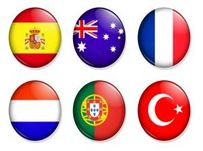The International Baccalaureate
Tuesday, 30th June 2009

The International Baccalaureate (or ‘IB’ as it is commonly known) is a relatively unknown qualification in the UK. It’s actually been around since 1968 though, and is available in 137 countries worldwide.
There are currently over 200,000 students from the ages of 3-19 working towards the IB. In the UK alone there are 195 teaching schools, yet very few people know anything about it.
Briefly explaining the history (since it’s been around for 40 years) you realise the true potential of this organisation. Founded in Geneva, Switzerland, in 1968, it calls itself a “non-profit educational foundation”. Although the first IB schools were predominantly private international schools, today over half of all IB World Schools are state schools - an impressive statistic. It spread globally from the late 1970’s, and is particularly popular in the USA.
More importantly, it’s recognised internationally. So, if you’re learning in Liverpool, you can very easily fly to Frankfurt to go to university. It’s a malleable way to learn. And it covers the entire school range from 3-19 (although the most popular IB qualification is for 16-19 year olds). The “Primary Years Programme” runs for 3-12 years, which is outlined to give “an opportunity for learners to construct meaning, principally through concept-driven inquiry.” The Middle Years Programme, for 11-16 year olds, offers a broad and balanced curriculum. The Diploma, which 1571 schools are authorised to teach, including 189 in the UK, takes students up to the same stage as the end of A-Levels.
The Diploma: 6 Subjects, plus CAS (creativity, action, service), TOK (theory of knowledge) and an extended essay. It sounds, somewhat, like it may not suit everybody. You have to study English, Maths, Science and a language: Which, to me, a humanities kind of girl, sounded like hell on earth. (Maths and Science for another two years – I couldn’t bear it!). So, when my school announced it was becoming an IB World School, I dismissed the idea straight away, without giving it any thought. Fully determined to avoid the International Baccalaureate at all costs, I refused to even think about studying it. Then I was made to give it some more thought. To anyone, I deemed in a moment of sanity, this should be an opportunity that should be seized.
An international qualification, I thought to myself, more opportunities to tan in a hotter country (and yes, I’ve got my priorities sorted out). An entire new world opened up to you. Sure, Maths and Science aren’t my favourite subject, but I’m not the only one with that problem. The range of subjects is great for both those who want to keep their options open and focus on international issues. I reckon we’ll see more of this exciting new qualification in the future!
For more information: http://www.ibo.org/
Tags: languages, modern languages, education, international baccalaureate
Posted by Madeleine under Attitudes to Language Learning, Teaching Languages,
Permalink
Posted by James Owen on 07/01 at 03:33 PM
Hi, great intro to the IB. I work for the IB and it's nice to see a positive write-up. The IB Diploma Programme has a reputation for being tough, but really it's a programme designed to get the best out of people...so it's as tough as you want to make it! Visit http://blogs.ibo.org/ibtv to see some student perspectives!
Posted by Alex Wolfson on 07/02 at 11:59 AM
I taught the IB program while I was working at an IB World School in Lima, Peru back in 2001/2002. Teaching this course and getting first hand experience of it really made me regret how I had not had the chance to do it. Like Madeleine I had considered myself a Languages and Humanities kind of person with no interest in maths and science - though more due to poor teachers than because the subjects themselves were uninteresting. I now feel there is a real gap in my knowledge because of my lack of studies in these disciplines and would (in hindsight) have loved to have spent a bit more time on science, particulalry environmental sciences.
I believe the AS A2 system gets young people "pidgeonholed" too early into becoming - like Medeline - a humanities person, or a sciences person etc. and that IB gives you more of a chance to work out where your interests really lie rather than just pick AS levels based on teachers you like - easily done!
Furthermore, IB means you have to take a foreign language up to 18. As we all know, this opens up all kinds of employment and life possibilities in the future.